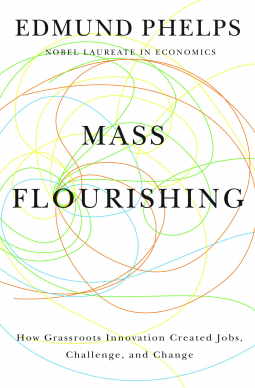
Mass Flourishing
How Grassroots Innovation Created Jobs, Challenge, and Change
by Edmund Phelps
This title was previously available on NetGalley and is now archived.
Send NetGalley books directly to your Kindle or Kindle app
1
To read on a Kindle or Kindle app, please add kindle@netgalley.com as an approved email address to receive files in your Amazon account. Click here for step-by-step instructions.
2
Also find your Kindle email address within your Amazon account, and enter it here.
Pub Date Sep 04 2013 | Archive Date Jul 30 2013
Description
In this book, Nobel Prize-winning economist Edmund Phelps draws on a lifetime of thinking to make a sweeping new argument about what makes nations prosper--and why the sources of that prosperity are under threat today. Why did prosperity explode in some nations between the 1820s and 1960s, creating not just unprecedented material wealth but "flourishing"--meaningful work, self-expression, and personal growth for more people than ever before? Phelps makes the case that the wellspring of this flourishing was modern values such as the desire to create, explore, and meet challenges. These values fueled the grassroots dynamism that was necessary for widespread, indigenous innovation. Most innovation wasn't driven by a few isolated visionaries like Henry Ford; rather, it was driven by millions of people empowered to think of, develop, and market innumerable new products and processes, and improvements to existing ones. Mass flourishing--a combination of material well-being and the "good life" in a broader sense--was created by this mass innovation.
Yet indigenous innovation and flourishing weakened decades ago. In America, evidence indicates that innovation and job satisfaction have decreased since the late 1960s, while postwar Europe has never recaptured its former dynamism. The reason, Phelps argues, is that the modern values underlying the modern economy are under threat by a resurgence of traditional, corporatist values that put the community and state over the individual. The ultimate fate of modern values is now the most pressing question for the West: will Western nations recommit themselves to modernity, grassroots dynamism, indigenous innovation, and widespread personal fulfillment, or will we go on with a narrowed innovation that limits flourishing to a few?
A book of immense practical and intellectual importance, Mass Flourishing is essential reading for anyone who cares about the sources of prosperity and the future of the West.
Edmund Phelps was the 2006 Nobel Laureate in economics. He is director of the Center on Capitalism and Society at Columbia University. His many books include Designing Inclusion, Rewarding Work, and Seven Schools of Macroeconomic Thought.
Advance Praise
"Anyone who finds today's economic debates too small-minded for the immense challenges we face should be drawn to this important work. Only Edmund Phelps would place ultimate blame for the Great Recession on the loss of the right concept of the good life. Phelps has been ahead of his time as an economic thinker for a half century. This may be his deepest, boldest, and most important work."--Lawrence H. Summers, Harvard University
"In this powerful book, Edmund Phelps disrupts lines of debate between right and left. He shows how human initiative and creativity hold the key to future economic prosperity and social progress, and argues that what is holding us back are not the demands of the needy, but rather the stranglehold of conservative attitudes and entrenched privileges, which have steadily narrowed the field for individual innovation and accomplishment."--Philip K. Howard, author of The Death of Common Sense
"In this magisterial sweep of historical storytelling, Edmund Phelps draws upon his rich and deep cultural hinterland--from Robin Hood to Karl Marx to Friedrich Hayek--to explore why some countries develop dynamic economies driven by incessant innovation and inspiration while others still lag far behind. Economic history has rarely been more penetratingly understood and engagingly told."--Nicholas Wapshott, author of Keynes Hayek: The Clash That Defined Modern Economics
"Few scholars have had the capacity to place the concept of the 'good life' in the context of both philosophical and economic thought. That is what Edmund Phelps has done in his masterly analysis of what he terms a 'modern economy,' once exemplified by Americans' capacity to innovate, to challenge, to dream--and to grow. But he warns that this model needs to be refreshed and changed to restore its potential."--Paul Volcker, former chairman of the Federal Reserve
Available Editions
| EDITION | Hardcover |
| ISBN | 9780691158983 |
| PRICE | $29.95 (USD) |



